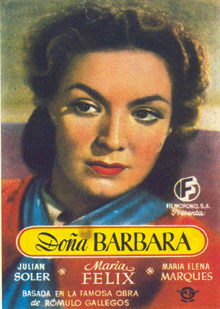Doña Bárbara (1943 film)
| Doña Bárbara | |
|---|---|

Mexico theatrical release poster
|
|
| Directed by |
Fernando de Fuentes Miguel M. Delgado |
| Produced by | Fernando de Fuentes Jesús Grovas |
| Written by | Fernando de Fuentes Rómulo Gallegos |
| Starring |
María Félix Julián Soler María Elena Marqués |
| Music by | Prudencio Esaá |
| Edited by | Charles L. Kimball |
| Distributed by | Clasa Films Mundiales |
|
Release date
|
September 16, 1943 |
|
Running time
|
138 minutes |
| Country | Mexico |
| Language | Spanish |
Doña Bárbara is a 1943 Mexican romantic drama film directed by Fernando de Fuentes and starring María Félix and Julián Soler. The film is based on the novel Doña Bárbara by Venezuelan author Rómulo Gallegos, who also co-wrote the screenplay.
Doña Bárbara is a wealthy landowner hardened by an experience she had as a teenager in which she was gang raped by the same men who killed her first love. She has accumulated her vast lands and cattle herds by using men, as well as illegal means, such as bribery of local officials. One of the few remaining other landowners in the area is Santos Luzardo, who has returned from abroad to take control of his family's ranch. He suspects his ranch foreman, Don Balbino, had been working for Doña Bárbara in stealing his cattle. The other men do not believe Santos will be a match for Doña Bárbara, but he demonstrates his superior horsemanship, and it seems the balance of power in the region is going to tip.
Doña Bárbara has a teenage daughter with Lorenzo Barquero, a former land baron that Doña Bárbara left broken and penniless. He is now an alcoholic. The girl, Marisela, is left to fend for herself, and Doña Bárbara has no interest in her, though Juan Primito, a servant of Doña Bárbara's secretly looks after her. Eventually, Marisela is discovered by Santos, who takes her and her father in, and gives the girl education.
Meanwhile, Doña Bárbara has become attracted to Santos, but when she finds that her own daughter is a rival for his affections, Doña Bárbara still looks for ways to ruin Santos.
Doña Bárbara has also been adapted into a 1975 Venezuelan telenovela, Doña Bárbara, as well as a 1998 Argentine film directed by Betty Kaplan.
...
Wikipedia
